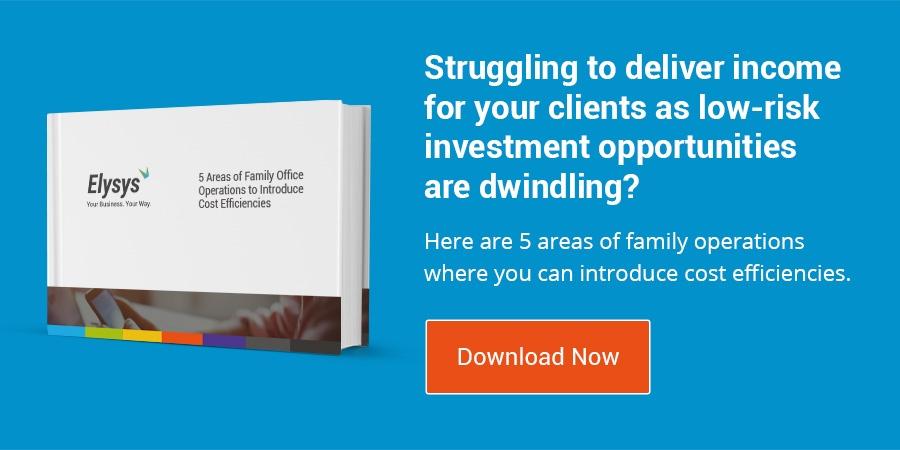Selection of Family Office Software: The Top Challenges Today
The first Family Offices were established in the prosperous late 1900's, more than a century ago. Great American entrepreneurs such as Judge Thomas Mellon, John D. Rockefeller and Henry Phipps were some of the first individuals who recognized a need for centralized management of their business fortunes for the sake of the future generations of Rockefellers, Phipps and Mellons.
Today, at the beginning of the 21st century, the world climate looks dramatically different. Multi-national Family Offices are facing a highly volatile economy and increased operating costs, and with that comes various new challenges in supporting the wealthy families who created them.
Challenges Affecting the Sustainability of Multi-National Family Offices
According to Benetta Park Johnson from Stout Risius and Ross, Global Financial Advisory Services, there are three main areas that are affecting the sustainability of Family Offices; the Regulatory Environment, Investment Strategies & Risk Management, and Staffing and Governance.
Regulatory Challenges Facing Multi-National FO’s
Multi-national Family Offices need to be aware of the government regulations prescribing how sensitive data should be used and stored in the various geographic zones where the FO might be operating.
Regulations in many countries can restrain certain registered financial institutions from holding clients’ data outside the jurisdiction of that country, for instance, storing client data on a Cloud server that is based outside of the country’s borders. The explanation given is that Cloud systems might hinder the regulatory or fiscal authorities in accessing the information. Other similar constraints exist in many countries and need to be taken into consideration.
Under the new European Union, General Data Protection Regulation (GDPR), coming into force this year, data security is no longer the sole responsibility of the data controller. In contrast, any company or individual that processes data “by which an individual can be identified” is held responsible for its protection. This includes third parties such as Cloud-providers and Multi Family Offices, wherever they are based. With the implementation of this new regulation, individuals are able to claim compensation in the case of loss or leakage of their personal data as result of unlawful processing.
Cloud for Overcoming Multi-National Regulatory Challenges
Although the GDPR does not explicitly prohibit companies from storing data in the Cloud, within or outside of EU borders, organisations are required to consider the comparative benefits of On-premise versus Cloud-based data storage system.
In circumstances where financial institutions, such as Family Offices, are prohibited from making use of foreign-hosted data servers, organisations can opt for making use of a family office software private Cloud option – either on-premise or hosted by a third party.
In light of the increasingly strict regulations faced by multi-national Family Offices, it is recommended that organisations conduct in-depth research on potential Cloud providers to ensure that they have acquired all necessary compliance certifications.

Best Practices in re-evaluating investment strategies include:
- Articulate a set of clearly defined objectives and policies for each family entity and trust, and stick with them. This includes matching a family’s liquidity needs to appropriate investment allocation and time spans.
- Ensure that appropriate due diligence and research is conducted in managing risks.
- Stress-test each investment policy for various circumstances that are reasonably likely to affect the family member in question. Analytical tools as well as extensive due diligence and research on investments are an important part of ensuring the suitability of a specific investment for a particular family client.
Cloud Software to Enhance Investment Strategies and Risk Management
While enterprise-level ERP systems tend to be the exclusive domain of big banks with big pockets, Software as a Service (SaaS) brings the same enterprise-level business intelligence within reach of Family Offices, by striking out the need to purchase expensive software licenses, on-premise infrastructure and software layout, and annual maintenance.
Cloud-based business intelligence solutions for third-party asset management opens the doors to powerful visualisation tools, allowing you to produce customised dashboards and reports to get unprecedented detail into the wealth you manage.
Staffing and Governance Challenges Facing Multi-National FO’s
Despite the economic downturn and the budgetary constraints that Family Offices are facing, a 2009 Family Wealth Alliance Poll showed that 48% of family office personnel have received new or additional service request from clients in the previous two years. Not only are service demands increasing, but younger generations need to be educated, while estate planning and accounting becomes more complex and more important as families grow.
According to Campden Research, participants in their Global Family Office Report 2015 have seen an increase in costs amounting to 7 basis points (from 92BP to 99BP). Quoting the executive of an American single-family office the report states:
Overall costs aren't too much higher than they were in previous years. However, salaries and other administrative costs have gone up, both in real terms and as a percentage of overall costs.
Today, more than ever before, multi-national Family Offices need robust software systems that:
- Streamline the back office and front office functions
- Integrate the operations of the FO’s international branches
- Maintain boundaries between different families’ transactions
- Ensure compliance with local and international legislation
- Cut down the administrative and reporting burden to bring back focus on management of the business
Outsourcing Non-Essential Services to a Cloud Provider
Multi-national Family Offices are recommended to evaluate their service offering, to determine the services that fall under internal expertise, and which other services could be successfully outsourced. The primary aim of an FO is to manage the wealth of its family clients, which must be segregated from secondary services. These secondary, or support services, such as IT support, software and hardware maintenance, and data storage should be considered non-essential, and peripheral to running the business.
Outsourcing these non-essential services to a Cloud provider that specialises in working with multi-national Family Offices can be of great advantage to the organisation, as the FO is essentially outsourcing all the drama of maintenance and support to a third-party, allowing the FO’s staff to give their undivided attention to the business.
